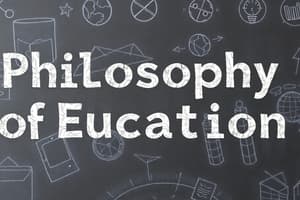Podcast
Questions and Answers
Which of the following is true about teaching philosophy?
Which of the following is true about teaching philosophy?
- An individual narrative that includes concrete examples of the ways in which learners learn in the classroom (correct)
- A purposeful and reflective essay about the author's teaching beliefs and practices (correct)
- A narrative that describes how one learns
- A self-reflective statement of one's personal belief (correct)
If the teaching philosophy focuses on the student's moral aspects, which philosophy is it based from?
If the teaching philosophy focuses on the student's moral aspects, which philosophy is it based from?
- Social Reconstructionism
- Existentialism
- Realism
- Idealism (correct)
Which of the following should NOT be done when writing a teaching philosophy?
Which of the following should NOT be done when writing a teaching philosophy?
- Use second person pronouns (correct)
- Create a clear picture of the teaching philosophy statement
- Writes in present tense
- Refrain from using technical terms
Teacher Marla uses differentiated activities in teaching her lesson in Science. Which philosophy did she use as reference?
Teacher Marla uses differentiated activities in teaching her lesson in Science. Which philosophy did she use as reference?
"The more senses involved, the better the learning." This is emphasized in ____.
"The more senses involved, the better the learning." This is emphasized in ____.
Which part of the teaching philosophy statement talks about pedagogy and classroom management?
Which part of the teaching philosophy statement talks about pedagogy and classroom management?
Which of the following philosophies is NOT learner-centered?
Which of the following philosophies is NOT learner-centered?
"I believe that all children are unique." The statement is in support of which philosophy?
"I believe that all children are unique." The statement is in support of which philosophy?
Teacher Agatha is teaching Science for 10 years. To make her lesson student-friendly, she uses problem-solving and discovery methods. Teacher Agatha's practice is an influence of the philosophy of ____.
Teacher Agatha is teaching Science for 10 years. To make her lesson student-friendly, she uses problem-solving and discovery methods. Teacher Agatha's practice is an influence of the philosophy of ____.
Mr. Ruiz is the National Service Training Program (NSTP) coordinator in his school. He always emphasizes "service to others" in all of their activities. Such belief is an influence of ____.
Mr. Ruiz is the National Service Training Program (NSTP) coordinator in his school. He always emphasizes "service to others" in all of their activities. Such belief is an influence of ____.
Flashcards are hidden until you start studying
Study Notes
Teaching Philosophy Overview
- A teaching philosophy is a purposeful and reflective essay outlining an educator's beliefs and practices.
- It can include self-reflections on personal beliefs, narratives of learning experiences, and concrete examples of classroom interactions.
Philosophical Approaches
- Idealism: Focuses on the moral aspects of education and the belief in the inherent goodness of students.
- Existentialism: Emphasizes individual uniqueness, asserting that every child has a distinct identity.
- Realism: Advocates for a practical approach to teaching, involving problem-solving and discovery methods for effective learning.
- Social Reconstructionism: Centers on promoting social responsibility and addressing societal issues through education, not primarily focused on the learner.
Writing a Teaching Philosophy
- Avoid using second person pronouns; maintain a first-person perspective to express personal beliefs.
- Writing should be done in the present tense, with clear and accessible language, steering clear of overly technical terminology.
Elements of a Teaching Philosophy
- The Body of the philosophy discusses pedagogy and classroom management practices.
- The Conclusion reinforces these elements and summarizes the educator's core beliefs and methods.
Philosophical Influence in Practice
- Teacher Marla’s use of differentiated activities exemplifies Realism by promoting active student engagement.
- Teacher Agatha applies Realism through problem-solving and discovery methods to enhance student participation.
- Mr. Ruiz embodies Social Reconstructionism, emphasizing "service to others" to foster a sense of responsibility among students.
Key Takeaways
- Realism: Involves multisensory learning and practical approaches for enhanced understanding.
- Existentialism: Advocates respect for individuality in educational settings.
- Social Reconstructionism: Focuses on societal improvement through education, differing from learner-centered approaches.
Studying That Suits You
Use AI to generate personalized quizzes and flashcards to suit your learning preferences.




